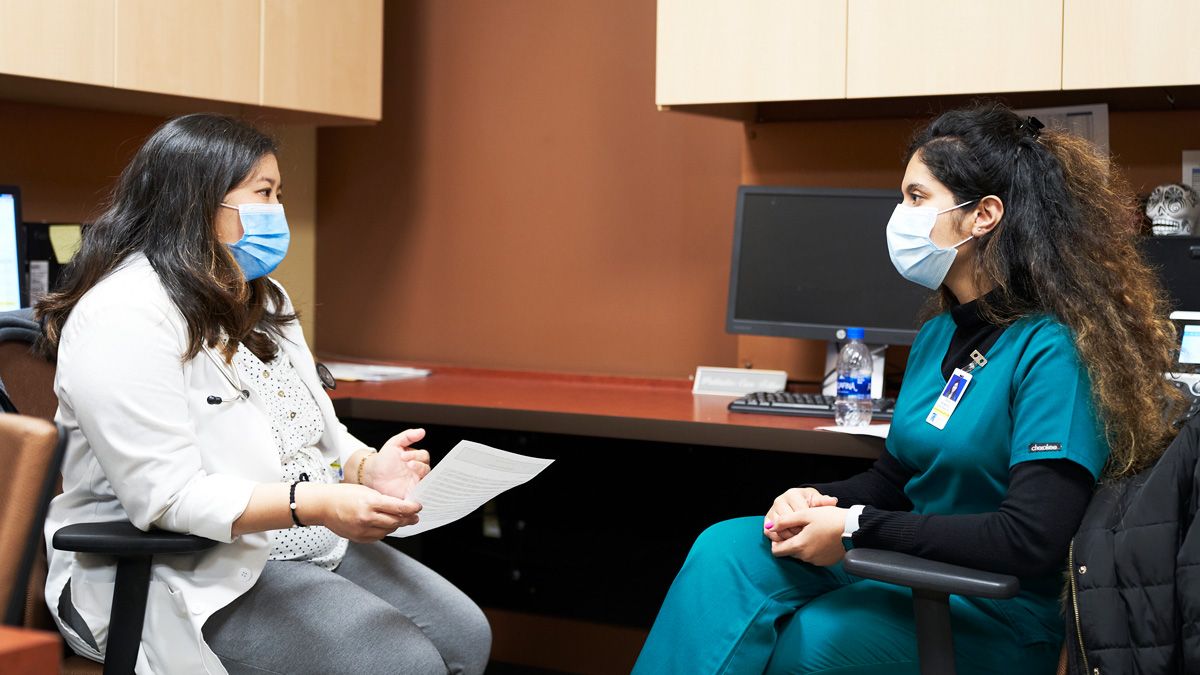Beyond diagnosis and treatment, multiple myeloma patients usually require additional services to maintain a high quality of life.
Relieving symptoms of bone damage
Multiple myeloma cells interfere with bone growth and cause bone destruction, so bones can become thin and weak wherever there are cancerous plasma cells. This bone damage can lead to painful fractures, especially of the vertebrae and ribs.
- Radiation therapy. When other treatments are not effective, patients with symptoms of bone or nerve damage — pain and numbness, tingling or muscle weakness — may find relief with radiation treatment.
- Vertebroplasty and balloon kyphoplasty. If a vertebra collapses, the spine may begin to curve forward, causing spinal deformity, interfering with balance and increasing the risk of additional fractures.
Roswell Park’s Neuroradiology Service offers both vertebroplasty and balloon kyphoplasty — minimally invasive options for treating pain caused by these fractures and other conditions. Vertebroplasty and kyphoplasty involve filling spinal fractures with bone cement.
Both procedures are performed on an outpatient basis and can provide significant pain relief from spinal fractures. In many cases, mobility improves dramatically and pain medications are no longer needed.
- Bone-strengthening treatment. Drugs such as bisphosphonates or Inhibitors of Receptor Activator of NF-κB Ligand (RANKL) can help to strengthen your bones, prevent bone thinning and reduce the risk of fractures. These drugs may also help relieve bone pain. Bone-strengthening drugs used for multiple myeloma include zoledronate, pamidronate or denosumab.
Bisphosphonates and RANKL inhibitors may lead to severe disease of the jawbone, called osteonecrosis of the jaw (ONJ), especially in patients with diseased teeth. Our multiple myeloma patients who receive these medications are referred to our own in-house dentists, who specialize in caring for patients with cancer. However, if your personal dentist determines that your dental health is good enough for you to take bisphosphonates, you will not have to see the Roswell Park dentists.
Relieving neuropathy
Multiple myeloma patients can develop peripheral neuropathy — weakness, numbness, burning or tingling, usually in the hands or feet — as a result of either the disease or its treatment. Our Palliative Care team can assist you if you develop neuropathy.
Pain management
If you experience pain that is difficult to control, you may benefit from the services of the Cancer Pain Management Service and Supportive and Palliative Care Program at Roswell Park. Using a team approach, these services unite the knowledge of anesthesiologists, psychologists, nurses, physical and occupational therapists, nutritionists and social workers, who work together to develop a comprehensive pain management plan designed to meet your specific needs. We want to emphasize that palliative care is a recommended component of cancer care for management of symptoms and side effects; it is not used only for end-of-life care.
To arrange for a second opinion, call 1-800-ROSWELL (1-800-767-9355) or fill out the online Become a Patient Form.
Our Supportive & Palliative Care program provides essential support and symptom management at any stage of your illness and alongside your cancer treatment. Our team will take the time to listen to you, assess your symptoms and provide a way forward to relieve physical symptoms and pain, ease distress and anxiety and improve quality of life.
